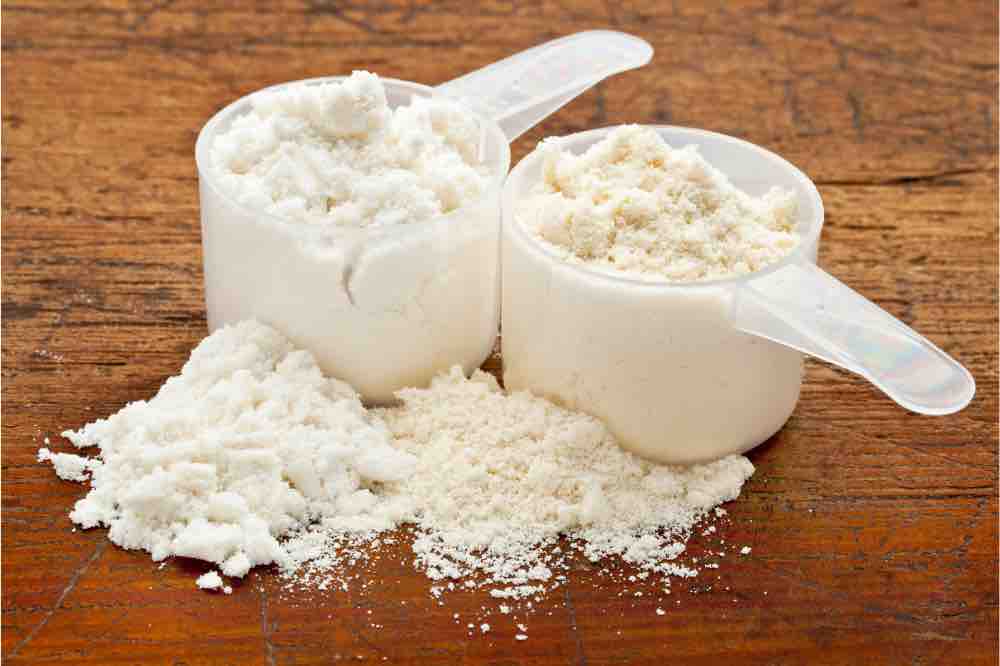Protein Power: How to Select the Perfect Whey Protein
Chances are, you’ve already come across whey protein in discussions with friends, on the internet, among athletes, or prominently displayed in supplement stores. Whey protein is indeed a widely recognized, utilized, and thoroughly studied supplement. But what exactly is this protein powder, and how can you choose the best one for your needs?
What is protein powder?
Whey protein is derived from the manufacturing process of cheese and various dairy products. It serves as a versatile strategy to augment daily protein intake, especially when meeting dietary recommendations isn’t feasible. It offers enhanced satiety and convenience, owing to its easy preparation. Beyond its popularity in the sports arena, whey protein can also be beneficial in managing various clinical conditions, including post-surgery recovery, diabetes, hypertension, sarcopenia, and more.
How does whey protein contribute to muscle mass gain?
1. Protein Intake:
Muscle hypertrophy hinges on an adequate protein intake that supports protein synthesis—the process of building and repairing muscle tissue post-exercise. Whey protein’s rapid absorption makes it an excellent choice post-workout when the body is most receptive to nutrients.
2. Stimulates Protein Synthesis:
Loaded with essential amino acids, whey protein, particularly leucine, a pivotal amino acid, activates protein synthesis. Leucine kickstarts the mTOR (mammalian target of rapamycin) metabolic pathway, boosting muscle protein synthesis and fostering muscle growth.
3. Amino Acid Profile:
Whey protein boasts an optimal blend of essential amino acids, notably BCAAs (leucine, isoleucine, and valine), which finely regulate muscle protein balance, encouraging protein synthesis while thwarting muscle breakdown.
4. Muscle Recovery:
Whey protein aids in post-exercise muscle recovery by mitigating muscle damage and post-workout inflammation. This facilitates consistent training, ultimately contributing to muscle growth over time.
Now that you understand the advantages of incorporating whey protein into your regimen, let’s delve into how to select a high-quality protein that aligns with your requirements, all while being budget-conscious.
What should I consider when chosing a whey protein?
Whey Protein Concentrate $
- Offers the best cost-to-benefit ratio.
- Contains between 29% to 89% protein (Opt for a minimum of 80% protein).
- Has a higher lactose, carbohydrate, and fat content compared to other types.
- May lead to abdominal discomfort and diarrhea in lactose-intolerant individuals.
Whey Protein Isolate $$
- Strikes a balance in terms of cost.
- Contains approximately 90% protein.
- Contains minimal or negligible amounts of lactose and lipids.
- Recommended for those with lactose intolerance.
Whey Protein 3W (Mix of Concentrate, Isolate, and Hydrolyzed) $$
- Represents a middle-ground in terms of cost.
- Contains approximately 90% protein and includes Concentrated, Isolated, and Hydrolyzed Whey, typically in a 3:2:1 ratio.
- Contains modest levels of lactose and lipids.
- Ideal for individuals with partial lactose intolerance.
Hydrolyzed Whey Protein $$$
- Comes at a higher cost due to complex production.
- Contains ≥ 90% protein.
- Includes hydrolyzed proteins for improved digestion and absorption.
- Recommended for those with protein digestion difficulties or intolerances.
For individuals without milk-related intolerances or allergies, concentrated whey protein is recommended due to its excellent cost-effectiveness.
If you’ve made it this far, we invite you to join our email list for the latest updates in sports nutrition. Additionally, you can create your free action plan to simplify your nutrition and enhance your athletic performance.
Conclusion
Choosing the right whey protein isn’t just about picking a product off the shelf; it’s a crucial decision that can impact your fitness journey. Armed with the knowledge from this guide, you’re now equipped to make an informed choice based on your goals and dietary preferences.
However, if you ever find yourself with more questions or in need of personalized guidance, don’t hesitate to reach out to a professional nutritionist. They can provide tailored advice, helping you optimize your protein intake and overall nutrition plan.
Remember, your journey to better health and fitness is unique, and having an expert by your side can make all the difference. So, whether you’re striving for muscle gain, post-workout recovery, or simply looking to enhance your daily protein intake, a nutritionist can help you navigate the world of whey protein with confidence (you can learn more about what we offer here and sign up here).
Here’s to your health and fitness success!




